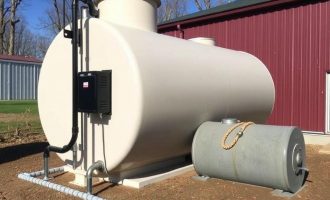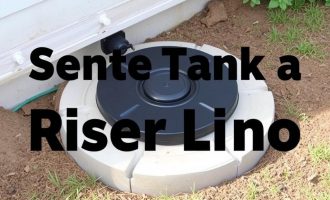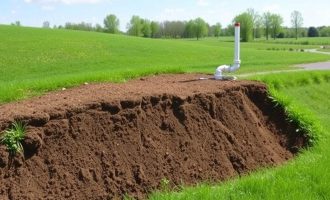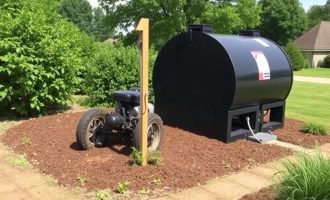Septic tanks are an essential part of many homes, especially in areas where public sewage systems are not available. If you rely on a septic system, you know it’s crucial to keep it in good working order. One of the most common and frustrating problems with septic systems is overflow, which can cause a mess, unpleasant odors, health hazards, and expensive repairs. But the good news is that preventing septic tank overflows is entirely possible with proper maintenance and mindful daily habits. Whether you are new to owning a septic system or have had one for years, understanding how to prevent septic tank overflows can save you money and stress in the long run.
In this comprehensive article, we will delve into everything you need to know about managing your septic system, identifying causes of overflow, and implementing practical steps to keep your septic tank functioning smoothly. We will use clear, simple language and practical examples so any homeowner can follow along comfortably. Let’s get started!
- Understanding the Basics: What Causes Septic Tank Overflows?
- Daily Habits to Help Prevent Septic Tank Overflows
- 1. Conserve Water
- 2. Be Careful What You Flush
- 3. Use Septic-Safe Products
- Proper Maintenance Routines for Your Septic System
- 1. Schedule Regular Pumping
- 2. Have Routine Inspections
- 3. Maintain the Drain Field
- When to Call a Professional: Signs of an Imminent Overflow
- Tips for Landscaping and Environment Around Your Septic System
- Common Myths About Septic Tanks and Why They Can Lead to Overflow
- Myth 1: You Can Put Anything Down the Drain – “It All Breaks Down”
- Myth 2: Additives Will Fix or Prevent Problems
- Myth 3: If I Have No Problems, My Septic System Is Fine
- DIY Checks and Preventative Actions You Can Take Today
- Summary Table: Quick Tips to Prevent Septic Tank Overflow
- Conclusion
Understanding the Basics: What Causes Septic Tank Overflows?
Before jumping into prevention tips, it’s important to understand why septic tanks overflow in the first place. At its core, a septic system is designed to collect and treat household wastewater. The septic tank holds wastewater long enough for solids to settle, while liquids flow into the drain field or leach field for further treatment and disposal.
When this balance is disturbed, the tank can fill up too quickly, or the drain field can become clogged, leading to an overflow situation. Several factors contribute to septic tank overflow, including:
- Excessive water usage: Overloading the system with too much water in a short time can overwhelm the tank and drain field.
- Improper waste disposal: Flushing or pouring grease, chemicals, or non-biodegradable items into drains can clog pipes and damage the septic system.
- Lack of regular pumping: If solids build up inside the tank and aren’t removed regularly, they can block pipes and flood the system.
- Drain field damage: Heavy vehicles, construction, or tree roots can crush or clog the drain lines that disperse the effluent.
- System age and poor installation: Older or incorrectly installed systems may not have the capacity or design to handle household waste effectively.
Knowing these causes helps frame the prevention strategies we’ll discuss next.
Daily Habits to Help Prevent Septic Tank Overflows
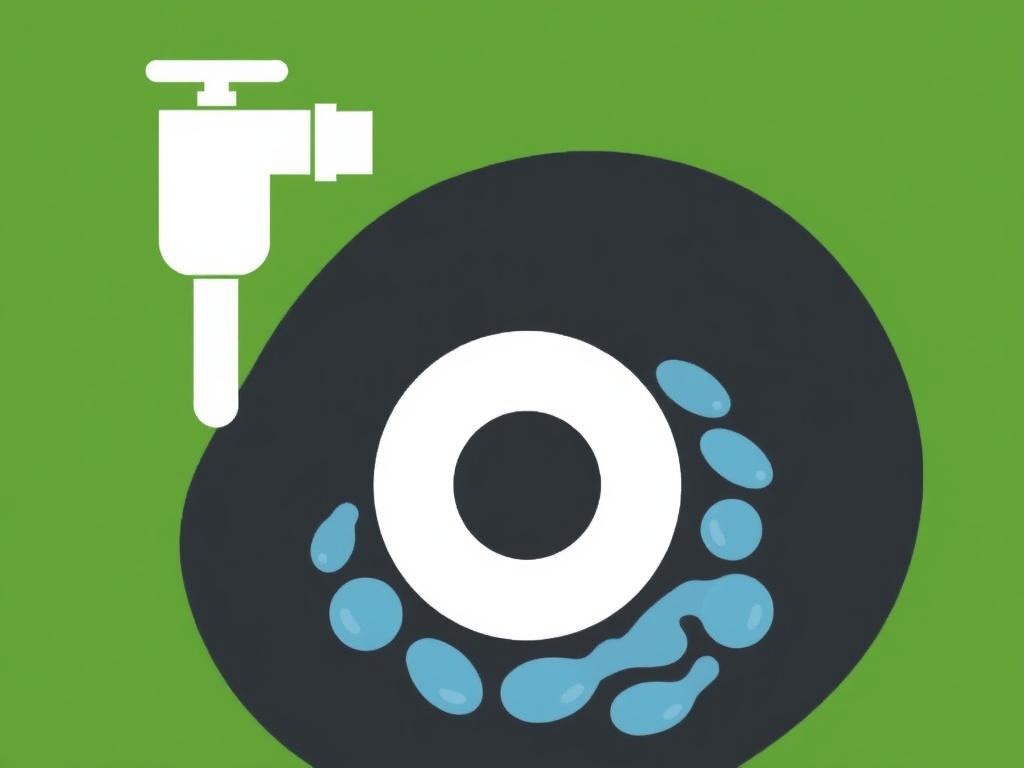
Prevention starts with everyday choices. Changing some simple habits can dramatically reduce your risk of septic tank overflow.
1. Conserve Water
Using too much water stresses your septic system. Every flush, laundry load, bath, and dishwashing cycle adds water that the system needs to process. When the tank and drain field are flooded, they cannot treat wastewater properly, leading to backups and potential overflow.
Here are some water-saving practices to adopt:
- Fix leaks immediately; even a dripping faucet wastes gallons daily.
- Spread out laundry loads throughout the week instead of doing many all at once.
- Use water-efficient appliances like low-flow toilets and showerheads.
- Turn off taps while brushing teeth or washing dishes.
2. Be Careful What You Flush
Your septic tank is not a garbage disposal. Flushing the wrong items can cause clogs and damage, leading to septic tank overflow. Avoid flushing:
- Sanitary products such as tampons, pads, and wipes
- Diapers
- Grease, fats, and oils
- Food scraps
- Chemicals such as paints, solvents, and antibiotics
- Paper towels and cigarette butts
Instead, dispose of these items in the trash. Pouring grease down the drain is one of the most common causes of septic system failures.
3. Use Septic-Safe Products
Many household cleaners contain harsh chemicals that kill beneficial bacteria vital for breaking down waste inside your septic tank. Using septic-safe, biodegradable cleaning products helps maintain a healthy bacterial environment in the tank.
Check labels for septic-safe claims and avoid antibacterial soaps or bleach in large quantities. Even everyday detergents can be harsh if overused.
Proper Maintenance Routines for Your Septic System
Daily care helps a lot, but regular maintenance is crucial for preventing septic tank overflows before problems arise.
1. Schedule Regular Pumping
One of the most important ways to keep your septic system healthy is pumping the tank every 3 to 5 years (depending on tank size and household use). Pumping removes the accumulated sludge and scum, preventing it from clogging the outlet pipe or entering the drain field.
Failing to pump your septic tank on schedule is a leading cause of septic tank overflows since solids build up over time and reduce the tank’s capacity.
2. Have Routine Inspections
Inspect your septic system annually to check for slow drains, odors, or wet spots near the tank or drain field, which can signal problems. A professional can conduct thorough inspections and identify early signs of failure.
3. Maintain the Drain Field
Protect the drain field by:
- Keeping heavy vehicles and equipment off the area
- Avoiding planting deep-rooted trees nearby, as roots can invade pipes
- Ensuring gutters and runoff water drain away from the field to prevent saturation
Regularly monitoring the drain field’s condition helps prevent system overload and effluent backup.
When to Call a Professional: Signs of an Imminent Overflow
Despite your best efforts, sometimes septic system issues arise. Recognizing early warning signs can help you address problems before a full overflow occurs.
Here are common indicators you should call for professional help:
| Warning Sign | What It Means | Action to Take |
|---|---|---|
| Slow Drains or Gurgling Sounds | Possible clog in pipes or a full tank | Schedule inspection and pumping |
| Unpleasant Odors Outside | Tank or drain field is leaking or overflowing | Call septic service immediately |
| Pooling Water or Wet Spots Near Tank/Field | Failure of the drain field or clogged tank | Stop water use and get professional evaluation |
| Backups in Toilets or Sinks | Septic system overload or pipe blockage | Minimize water use and call expert |
Taking swift action at these signs can prevent a full septic tank overflow disaster.
Tips for Landscaping and Environment Around Your Septic System
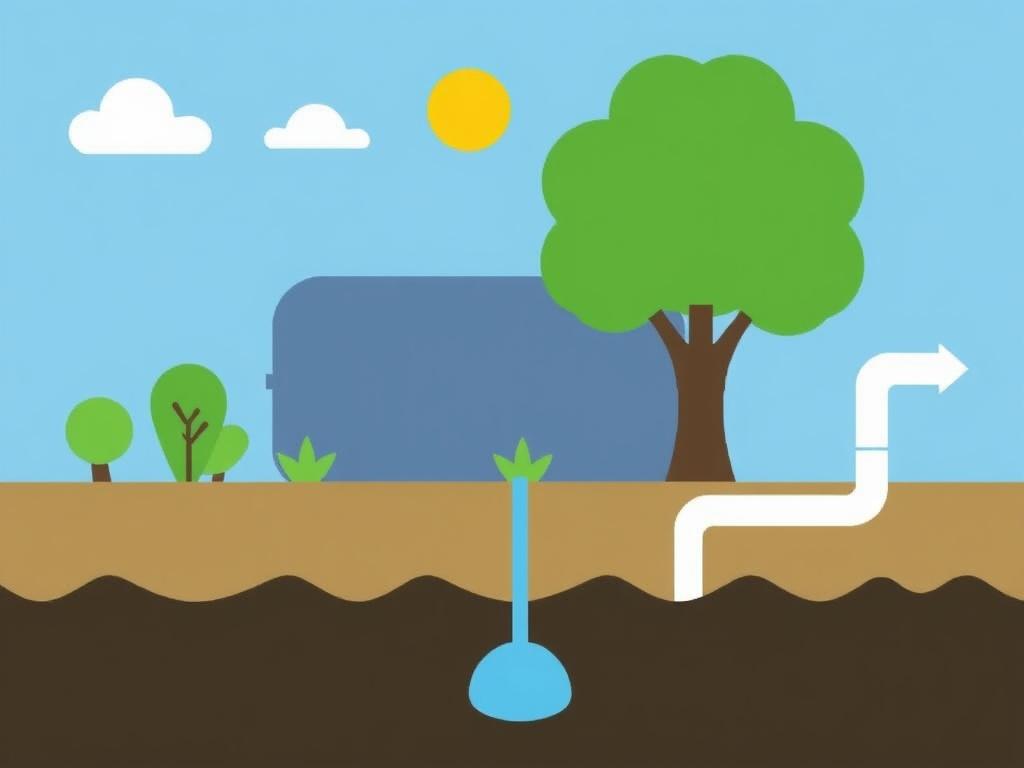
The area around your septic tank and drain field plays a vital role in the system’s performance. Thoughtful landscaping can help prevent damage and avoid overflows.
- Plant Grass Rather than Trees: Grass helps absorb excess moisture and prevents soil erosion without risk of root intrusion.
- Avoid Heavy Equipment: Never drive or park vehicles on top of your septic system to prevent crushing pipes and compacting soil.
- Redirect Runoff Water: Ensure rain gutters, sump pumps, and downspouts divert water away from the drain field to avoid oversaturation.
- Mark the System Area: Clearly mark the location of your septic tank and drain field to avoid accidental disturbance during garden work.
Proper landscaping supports your septic system’s natural filtration and reduces the risk of overflow.
Common Myths About Septic Tanks and Why They Can Lead to Overflow
Misunderstandings about septic systems often lead to misuse and preventable problems. Let’s bust a few common myths:
Myth 1: You Can Put Anything Down the Drain – “It All Breaks Down”
Reality: Septic tanks rely on bacteria that digest organic waste, but many items, such as grease, diapers, wipes, and chemicals, do not break down and cause blockages and damage.
Myth 2: Additives Will Fix or Prevent Problems
Reality: There is little scientific evidence that chemical additives improve septic system performance. Regular pumping and proper maintenance are the best defense.
Myth 3: If I Have No Problems, My Septic System Is Fine
Reality: Septic systems can fail silently. Regular inspection and pumping are essential even if no symptoms exist.
Understanding these truths helps you avoid behaviors that increase overflow risk.
DIY Checks and Preventative Actions You Can Take Today
If you want to be proactive, here are some quick checks and actions you can do yourself:
- Check toilet and faucet leaks using food coloring to see if water is running continuously.
- Observe water pooling or overly green grass patches near the septic area.
- Keep a record of pumping dates and schedule the next ones proactively.
- Ensure lids and risers are sealed tight and safe from damage or intrusion.
These simple home inspections can catch problems early.
Summary Table: Quick Tips to Prevent Septic Tank Overflow
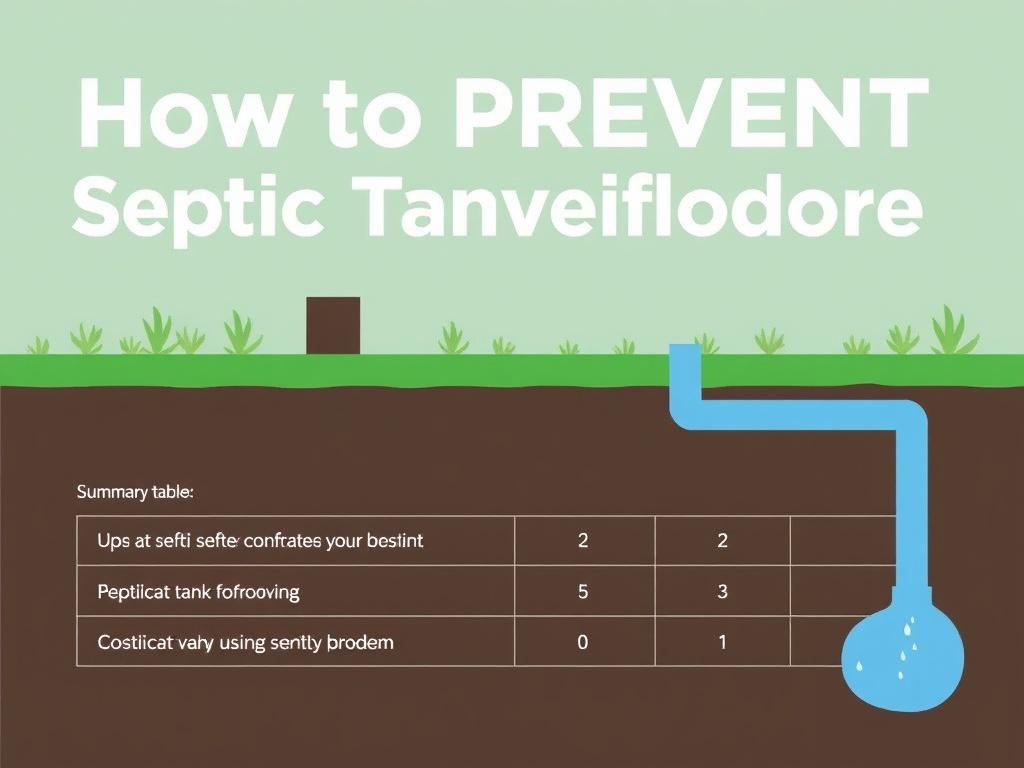
| Tip | Reason | How It Helps |
|---|---|---|
| Use water efficiently | Prevents system overload | Reduces strain on tank and drain field |
| Don’t flush harmful items | Avoids blockages and damage | Keeps pipes and tank clear |
| Schedule regular pumping | Removes solids buildup | Makes space for wastewater |
| Protect your drain field | Prevents physical and water damage | Ensures proper wastewater disposal |
| Use septic-safe products | Maintains bacterial health | Improves waste breakdown |
Conclusion
Preventing septic tank overflows doesn’t have to be a daunting task. By understanding how your septic system works, adopting mindful daily habits, scheduling regular maintenance, and watching for warning signs, you can protect your home from messy and costly septic problems. Good water management, avoiding flushing harmful substances, and caring for your drain field play crucial roles in extending the life and effectiveness of your system. Remember, while some actions you can do yourself, never hesitate to call a septic professional when problems arise or for routine inspections. Taking these preventive steps ensures your septic system continues to function smoothly, safeguarding your health, property, and peace of mind for years to come.
Помогла вам статья?


